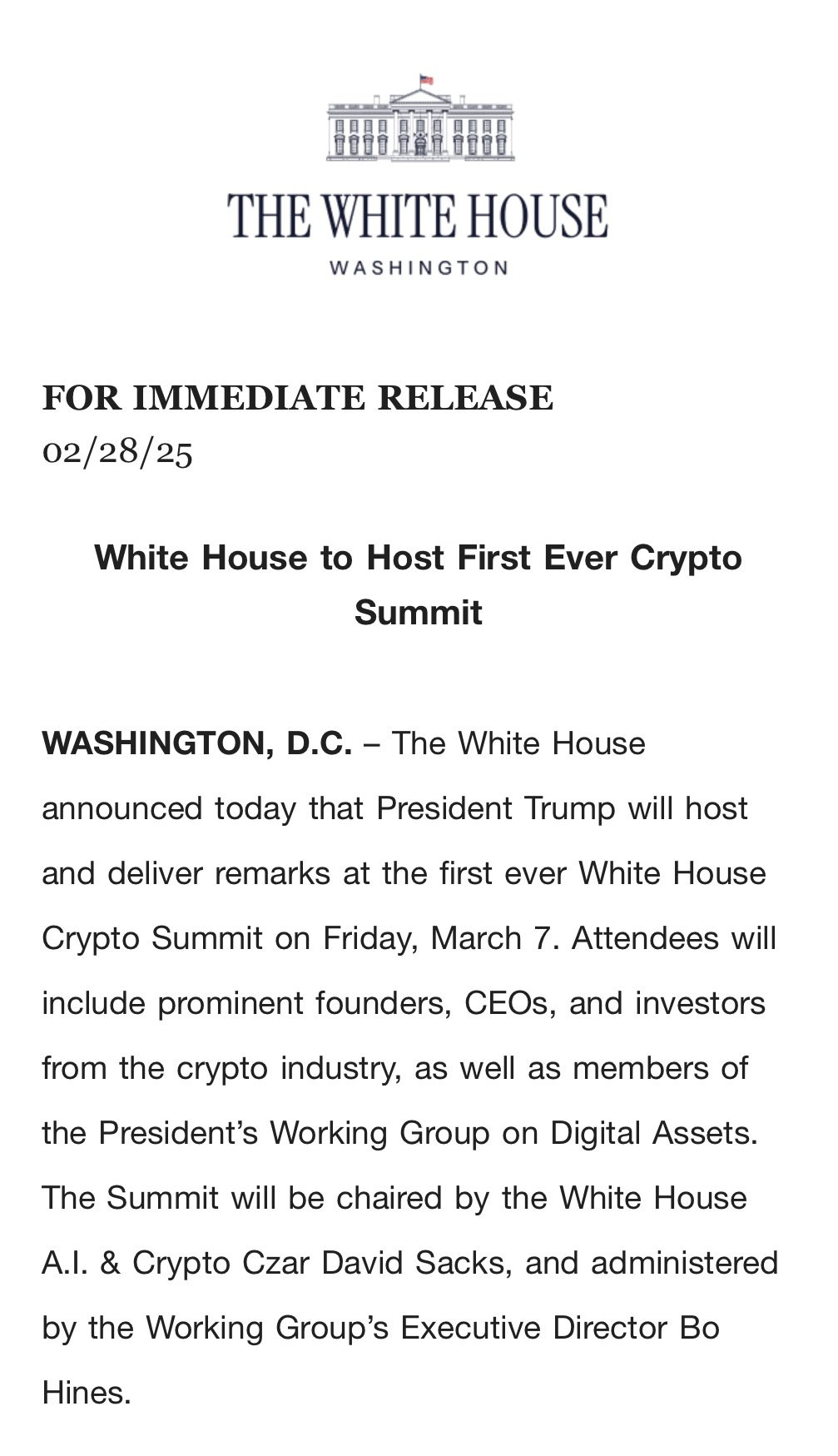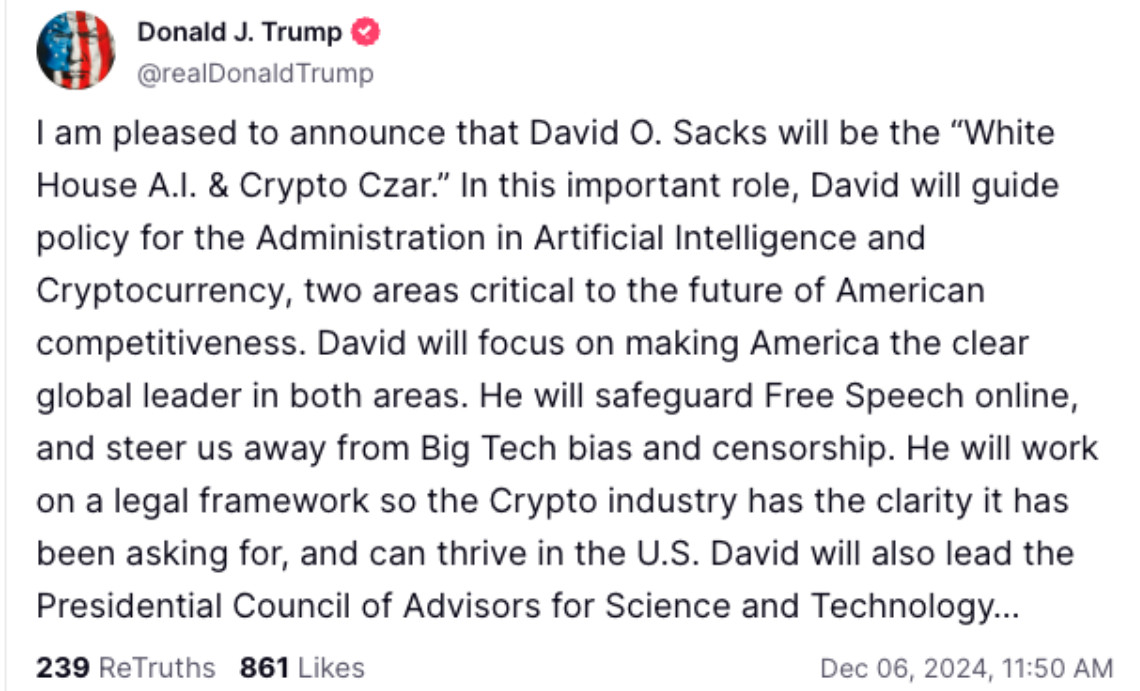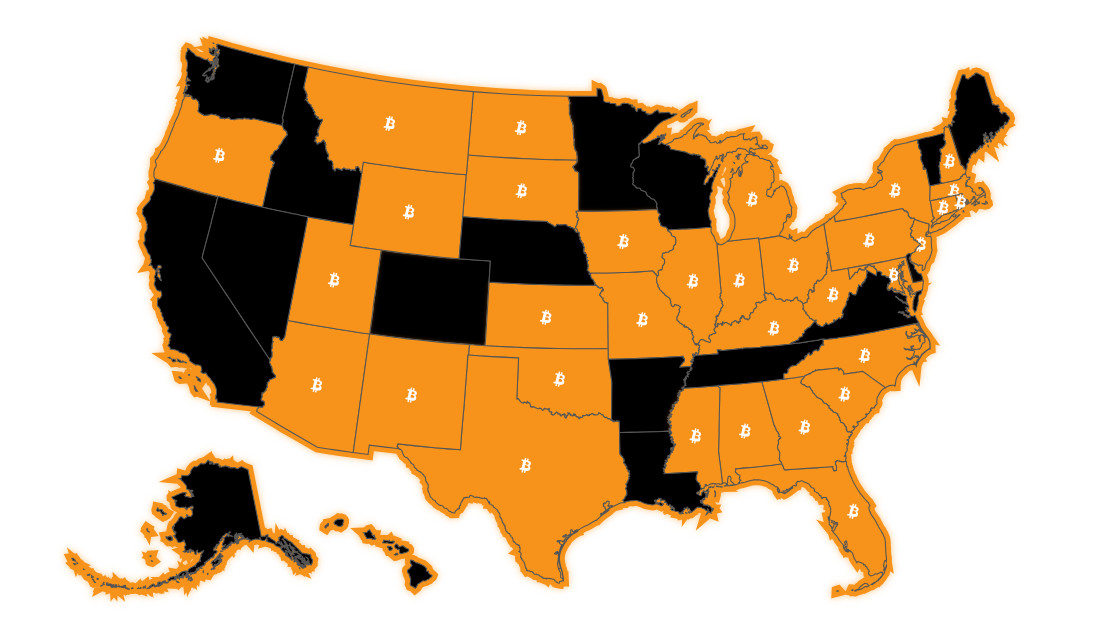The White House Crypto Summit: A Game-Changer for the Industry?

A Historic Moment for Crypto
Could the tides be turning for crypto regulation in the U.S.? President Donald Trump’s upcoming White House Crypto Summit, scheduled for March 7, might signal a significant shift. This gathering of industry leaders, prominent investors, and regulatory policymakers aims to discuss the future of Bitcoin, stablecoins, and the role of crypto in the U.S. financial system.
Spearheaded by David Sacks, the White House’s “AI and Crypto Czar”, and administered by Bo Hines, this summit could shape the crypto landscape for the next four years. With increasing pressure to provide regulatory clarity, all eyes are on Washington.
 David Sacks
David Sacks
Source: David Sacks
Crypto Regulation in the U.S.: A Long-Awaited Conversation
Since his appointment on December 6, 2024, David Sacks has been tasked with laying the foundation for comprehensive crypto regulation—a move that crypto enthusiasts and institutional investors have long been waiting for.
President Trump, in his announcement, emphasized the need for clear legal frameworks to encourage crypto innovation while ensuring user protection. He also highlighted Sacks’ role in safeguarding online speech and countering Big Tech censorship.
 Donald Trump
Donald Trump
Source: Donald Trump
A National Push for Blockchain Innovation?
This summit isn’t just a discussion. It sets the stage for potential legislative changes that could finally give the crypto industry the regulatory structure it’s been demanding. Trump has previously outlined ambitions to position the United States as a global hub for blockchain innovation—this summit is our first glimpse at how he plans to make that happen.
The Big Topics: Stablecoin Oversight & A U.S. Bitcoin Reserve
While the official agenda remains under wraps, industry insiders speculate that stablecoin regulation and a potential U.S. Bitcoin reserve will take center stage.
The Stablecoin Debate: Bringing Issuers Under U.S. Regulation
The debate around stablecoins has been heating up, especially after Jeremy Allaire, co-founder of Circle, voiced his opinion that all stablecoin issuers must be registered with U.S. authorities, regardless of their location.
In a recent Bloomberg interview, Allaire argued that issuing a U.S. dollar-backed stablecoin without U.S. oversight poses risks to both consumers and the broader financial system:
“Whether you are an offshore company or based in Hong Kong, if you want to offer your U.S. dollar stablecoin in the U.S., you should need to register in the U.S. just like we have to go register everywhere else.”
With stablecoins playing an increasingly critical role in global finance, regulatory oversight could become a make-or-break factor. If the summit addresses stablecoin legislation, we may finally see much-needed clarity on the topic.
A Strategic Bitcoin Reserve? The Growing Interest in BTC
The idea of a U.S. Bitcoin reserve has gained traction over the past year, with multiple states proposing legislation to incorporate BTC into their financial frameworks. At least 24 states have shown support for such initiatives, reflecting a broader recognition of Bitcoin’s potential as a strategic asset.
 Bitcoin Reserve Bills
Bitcoin Reserve Bills
US states with Bitcoin reserve bill propositions. Source: Bitcoinlaws
That said, some analysts believe these state-level Bitcoin reserve initiatives are symbolic rather than game-changing. Iliya Kalchev, an analyst at Nexo, cautioned:
“Unless the hearing unveils a near-term purchase plan or a major policy shift, the market’s response will likely be mild, as Texas’ pro-crypto stance is already well known.”
Nonetheless, Bitcoin’s performance speaks for itself—it has averaged over 1,077% returns over the past five years. If discussions about a federal adoption of Bitcoin gain traction, the implications could be massive.
What’s Next? The Race Against the Clock
White House insiders suggest that Sacks has roughly two years to drive meaningful pro-crypto policies before the 2026 midterm elections. Joe Doll, general counsel at Magic Eden, warned that political gridlock could slow down progress unless the administration moves quickly to solidify regulatory frameworks while controlling both chambers of Congress.
The urgency is real:
✅ Will we finally see an official U.S. stance on stablecoins?
✅ Can Bitcoin become a strategic financial asset on a federal level?
✅ Will crypto-friendly policies emerge before political tensions slow them down?
Final Thoughts
The White House Crypto Summit could be a pivotal moment for the industry. While the crypto community remains cautiously optimistic, the outcomes of this meeting may dictate how the U.S. engages with digital assets, blockchain innovation, and financial decentralization in the years to come.
What do you think? Will the U.S. embrace crypto and position itself as a leader in blockchain regulation, or will the hurdles prove too high? We’ll find out soon. 🚀
Related:
🔗 Bitcoin risks deeper drop if $75K support fails
🔗 Altseason 2025: ‘Most altcoins won’t make it,’ CryptoQuant CEO warns
🔗 Unstablecoins: Depegging, bank runs, and other risks loom

